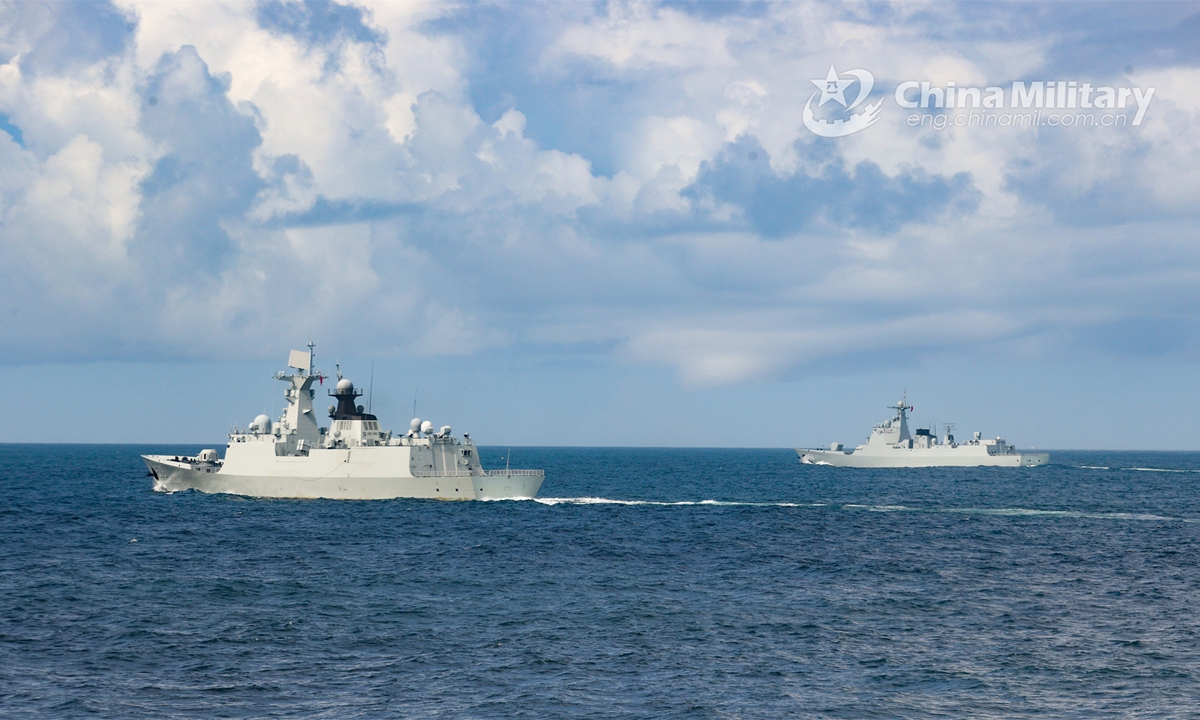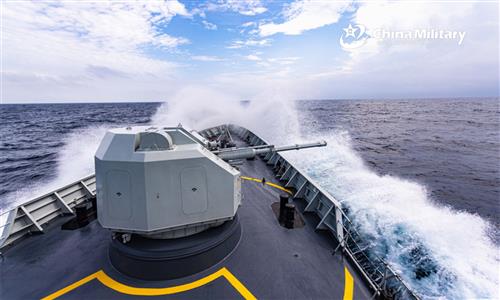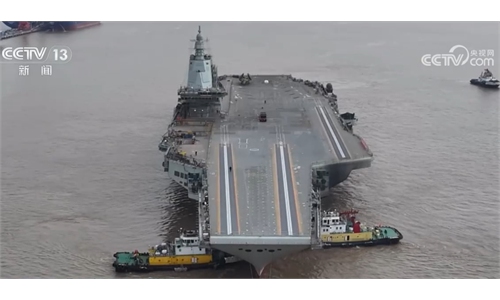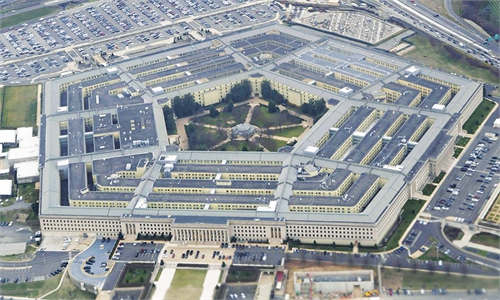PLA holds naval, air patrols in S.China Sea amid provocations
Troops defend China's territorial sovereignty, maritime rights

Warships attached to a destroyer flotilla with the PLA Navy sail in formation during a recent real-combat training exercise. (Photo:China Military)
The Chinese People's Liberation Army (PLA) held a routine patrol in the South China Sea from Wednesday to Thursday in a move to safeguard national sovereign security and maritime rights and interests amid a concurrent US-Philippines joint patrol and Manila's repeated attempts to permanently occupy Chinese reefs in the region.
China's legitimate and professional restriction measures against the Philippines' scheme have been restrained, but the Southeast Asian country's recurring provocations and the involvement of the US military could force China to enhance the intensity of its military and law enforcement measures, as the PLA's latest operation drew a red line, served as a deterrence and could reduce the risk of misjudgment and accidents, experts said.
The PLA Southern Theater Command organized naval and air forces to conduct a routine patrol in the South China Sea from Wednesday to Thursday, the PLA Southern Theater Command said in a press release on Wednesday.
"The troops of the theater command are on high alert so as to firmly safeguard national sovereign security and maritime rights and interests. Any military activities that upset the situation or create tension in the South China Sea are completely under control," the press release read.
While the PLA Southern Theater Command did not name the parties that could "upset the situation or create tension," Reuters reported on Wednesday that the Philippines and the US began a two-day joint patrol in the South China Sea on Wednesday.
It marks the second US-Philippines joint patrol since November 2023 and involves four vessels from the Philippine navy and four ships from the US Indo-Pacific command that include an aircraft carrier, a cruiser and two destroyers, according to the Reuters report.
Commenting on a question on the concurrent patrols by the PLA, and the US-Philippines one, Wang Wenbin, a spokesperson for China's Ministry of Foreign Affairs, said at a regular press conference on Thursday that the goal of the military provocation activities by the Philippines and the US in the South China Sea is flexing its military muscle, and are not conducive to the management and control of maritime situations and disputes.
"We urge relevant countries to stop their irresponsible moves and respect efforts by regional countries to safeguard peace and stability in the South China Sea," Wang said, noting that China will continue to firmly safeguard its territorial sovereignty and maritime rights, and actively safeguard peace and stability in the region.
Ding Duo, deputy director of the Institute of Maritime Law and Policy at the China Institute for South China Sea Studies, told the Global Times that the PLA's patrol is a pointed operation against a series of infringement and provocative actions by the Philippines and the US in the South China Sea.
It displays China's determination and will in safeguarding territorial sovereignty and maritime rights in the South China Sea, and that this determination and will are steadily growing along with the growing strength to do so, Ding said.
The operation announced by the PLA Southern Theater Command can serve as a deterrence against forces that stir up trouble. It is also a necessary act to safeguard peace and stability in the region, Ding said, noting that by demonstrating determination, will and capability, the trouble-stirring forces will have a clear understanding of China's red line and capabilities, and this will help prevent misjudgments and accidents from happening.
The PLA Southern Theater Command on Thursday announced that it recently also held a live-fire air-to-air missile attack exercise over the South China Sea.
Featuring KJ-500 early warning aircraft, J-15 carrier-based fighter jets and J-11B land-based fighter jets, the exercise further tested the performance of weapons and systems as well as the skills and tactical capabilities of the pilots, according to a press release and a video released by the PLA Southern Theater Command.
This exercise is a separate event from the routine patrol, and displayed the PLA's capabilities in seizing air superiority over the South China Sea, a Beijing-based military expert who requested anonymity told the Global Times on Thursday.
It demonstrated the PLA's systemic combat capabilities that integrate carrier-based fighter jets and land-based fighter jets through early warning aircraft, as these can detect targets and then distribute missions in an orderly manner and guide missile attacks, the expert said.
With the PLA's comprehensive area denial and anti-access combat system, even US aircraft carriers will become very vulnerable if a conflict breaks out on China's doorstep, experts said.
Restrained responses
The PLA Southern Theater Command's patrol also comes as the Philippines has been frequently provoking China over Chinese islands and reefs in the South China Sea, especially near Ren'ai Jiao (also known as Ren'ai Reef), since August.
Under the guise of humanitarian resupplies, the Philippines has repeatedly sent vessels carrying illegal building materials in attempts to reinforce a warship that has been illegally grounded on Ren'ai Reef since 1999 in order to permanently occupy the Chinese reef, breaking its promise made to China that it would tow away the ship.
Those attempts were blocked by China Coast Guard (CCG) vessels using legitimate and professional restriction measures.
The Philippine side hyped that the CCG used water cannons to "attack" Philippine vessels in the process, but Chen Xiangmiao, director of the World Navy Research Center at the National Institute for South China Sea Studies, told the Global Times that the CCG's measures, including the use of water cannons, were very restrained, as they are defensive, not offensive.
Senior Colonel Wu Qian, a spokesperson at China's Ministry of National Defense, said at a regular press conference on December 28 that the Philippine side had claimed to be carrying humanitarian supplies, but the supply vessels were actually carrying journalists and propagated disinformation.
"In my view, these are not humanitarian supplies at all, it is deliberately creating an incident, playing victim and putting on a show in the guise of humanitarian supplies," Wu said.
China is always committed to resolving differences through dialogue and consultation and making joint efforts to maintain maritime stability, but we will not turn a blind eye toward the Philippines' repeated provocations and harassment, the spokesperson said.
Wu also slammed the US' groundless criticism of China's safeguarding of legitimate rights, saying that the US incited the Philippines' provocations for its own selfish interests and attempted to use the US-Philippines Mutual Defense Treaty to threaten China. "This does not work on China," he said.
It can be predicted that the Philippines and the US will continue to make provocations in 2024, and when dealing with those attempts to stir up trouble, China will likely enhance the intensity of its military and law enforcement measures, Ding said.
In both the short and long term, China's determination and capability in controlling the situation are increasing, Ding said.
"We will make sure the situation in the South China Sea remains stable," Ding said.




